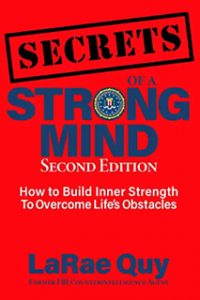As a female FBI agent, there weren’t always a lot of women in my office—or in the building, for that matter. The closest thing to a mentor I had was my male training agent, who viewed me as more of a burden than an opportunity.
But it had been to my advantage to be raised on a cattle ranch in the middle of Wyoming. It was a tough environment—fast food was hitting a deer at 60 miles an hour. My grandmother wrote down ammo for her Christmas list. And you never whine and complain to a grandmother who is a crack shot with a rifle.
This was exactly the type of mental toughness I needed when I found myself as a new agent on an FBI squad with few allies. FBIHQ sends new agents into the field with a thick manual crammed full of to-do lists that ensure a dud didn’t accidentally sneak through screening at the FBI Academy in Quantico. It’s an environment where you need to prove yourself first—before others step up to give advice and direction.
Are you mentally tough? Take this FREE assessment.
So it should not have been a surprise that a mentor failed to take me under their wing. I could have blamed my fellow agents, but that would only make me sound whiny and weak. I knew that I would need to find my own way to move forward if I wanted to be successful.
On my first squad, I was assigned a desk next to a hardened older agent named Leo who looked at me with suspicion—could a woman be relied upon to have his back if we found ourselves in a shootout? He thought not, or at least had his doubts. I could tell by the way he treated me—with quiet disdain.
Like many of you, I’d been inundated by testimonies from the great and famous about the mentor who turned their life around, and how-to articles and books on the joys of working with the perfect mentor.
Here’s a typical definition of mentorship—sweet and idealistic:
“Mentoring is a long-term relationship that focuses on the growth of the mentee. The mentor is a great source of wisdom and support.”
To begin with, mentoring is not always a long-term relationship. A person can be a mentor in one area for a short period of time before you move on. And second, while a good mentor can offer wisdom, they may or may not, offer outward gestures of support. Simply put, they don’t need to hold your hand and be your best friend.
I suspect somewhere such an angel does exist, but not in my world. Many of you may have had a similar experience where a kind soul didn’t step up and offer to show you the secrets to success in your new job, where to find the break room or give directions to the bathroom. A place where you had to prove your worth before someone took you under their wing.
The term mentor has been watered-down in the last few years. It can encompass anything from self-help books to touchy-feely therapy sessions when times get tough. I want to share with you some of the lessons I’ve learned about how to know when you’ve found the perfect mentor:
1. Clarity On Goals
The first place to start is to have clarity on goals, both short and long-term. The more specific you are with your goals, the easier it will be to find the right mentor.
Goals focus your attention so you can organize your time and resources to make the most of your life and career. Clarity is essential when it comes to setting goals. Your goals should be clear and specific because generic goals will only create confusion rather than clarity.
Follow this simple rule: A mentor needs to be more of an expert than you in the field in which you’re trying to improve.
How To Make It Work For You:
- Identify a person who has the job you want in 5, 10, or 15 years?
- Examine the path they took to get there.
- Keep a running list of the skills and talents needed to get the job.
- What are the stepping stones you need to get the job?
2. Rethink Formal Relationships
Not all mentoring relationships need to be a formal arrangement. Leo was an unwitting mentor who would be horrified to think that I considered him as one! But I watched how he worked his cases. He was a thorough investigator who pursued any and all leads. And even when he didn’t have any, he still kept at it.
Mentors teach, coach, guide, and motivate. Leo did all of these things for me, although he didn’t know it. I used the information I learned from him, about how to read body language and listen for verbal cues, for the rest of my career! I never liked Leo, and we never so much as sat together over a cup of coffee, but he was one of the best mentors I ever had.
How To Make It Work For You:
- Ask yourself where you’re looking for growth. Be specific. And then find an expert.
- A mentor doesn’t need to be senior to you; they just need to do something better than you do.
- Mentorship doesn’t have to last years; maybe it needs to last only one day, one month, or one project.
- Warm and fuzzy relationships are not essential.
3. Be Wary—Very Wary, Of Praise
Like most overachievers, I look for praise in almost everything I do.
As a first-grade student, I was never satisfied with anything less than an A. My teacher, Mrs. Archie, was very stingy with praise, so you can imagine how much I disliked her. She let me know right away that I was not the smartest person in the room, so when I did get an A she responded with, “You’ve worked very hard to get this grade.” I didn’t realize it at the time, but she had created a growth mindset in the way that I looked at my obstacles.
Researcher Carol Dweck discovered that our mindset affects our ability to fulfill our potential—to grow and learn, take risks, bounce back from adversity, and build healthy relationships.
If we have a “fixed mindset,” we believe our qualities, and that includes our intelligence, are something we were born with and cannot be changed. If we have a “growth mindset,” we believe that we can cultivate and grow our basic qualities, including our intelligence.
Some of the brightest people avoid challenges, don’t work hard, and wilt in the face of difficulty. In other words, it’s not always the people who start out the smartest in the room who end up the smartest.
How To Make It Work For You: Look for a perfect mentor who will challenge you to create a growth mindset, a “can-do” attitude about how to overcome the obstacles that show up in business and life.
4. Create A Strong Mind
My grandmother was a larger-than-life force in my life. When things didn’t work out the way I expected, she taught me how to be mentally tough. She had no time for people who would not take responsibility for their situation.
I didn’t sweat it when I found no females to mentor me as an FBI agent. I knew that if I wanted to be treated as an equal, I needed to act as an equal. It wouldn’t help to whine, complain, and blame others. I needed to take responsibility.
If women plan to use the excuse that they can’t make their way up the corporate ladder because there aren’t other women to mentor them, then they haven’t taken their careers very seriously.
Take responsibility and find the best person to inspire you to be the best you can be. If there are no heroes to save you, you be the hero.
How To Make It Work For You: Ask these questions when you look for a mentor from among the people around you:
- How can they help me be better at my job?
- Are they respected by subordinates, peers, and superiors?
- What skills do they have that I need to develop?
- How much more do they know more about (this project) than I do?
- In what ways are they willing to share that knowledge?
- Will they give me the honest feedback I need?
- Why do I admire them?
- How will working with them make me a better person?
5. Play Big
In the FBI, power meetings among male leaders were held during happy hour—the ones I was never invited to attend. In many larger corporations, power meetings are held in the men’s bathroom during bio-breaks. Either way, the opportunity for women to participate is limited.
When I was tempted to play the victim, I thought about Leo. He was awkward, ugly, and had a quirky personality. He wasn’t invited to happy hour, either. And yet, the truth is this: Leo was a big player in the world of FBI counterintelligence investigations. As my unofficial mentor, he reminded me that people will do things to let you down, and even screw you over—that is life!
So get over it.
Leo refused to think small. He’d never start a sentence with, “I’m not an expert but…“ and then apologize. He taught me that leaders, both men and women, need to play big and take control of how they react to a situation. When the going gets tough, roll up your sleeves and get even tougher.
He taught me how to recognize self-doubt and not let it dictate my actions. If you look for discrimination in business, you will find it. Leo’s advice to me? Just don’t. Don’t look for it or it will pull you down with it.
How To Make It Work For You: Do yourself a favor and assume the best of everyone around you. But remember—while it’s a good idea to give most people the benefit of the doubt, ALWAYS verify whether their intentions can be trusted or not. Don’t be the fool that takes everything you hear at face value.
Bottom line: you don’t need a special person to make you special. You don’t need someone who believes in you IF you believe in yourself. You DO need to search out and find those from whom you can learn the ropes to success in your field.
© 2021 LaRae Quy. All rights reserved.
You can follow me on Twitter, Facebook, Instagram, AND LinkedIn
Are you mentally tough? Here is my FREE Mental Toughness Assessment
Check out my new online training program at www.SecretsOfAStrongMind.com
Get my new book, “Secrets of a Strong Mind (second edition): How To Build Inner Strength To Overcome Life’s Obstacles”
Author of “Mental Toughness for Women Leaders: 52 Tips To Recognize and Utilize Your Greatest Strengths
Blog photo by Timon Studler on Unsplash






Recent Comments